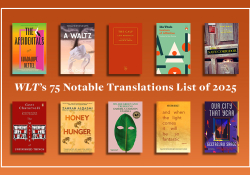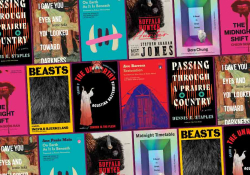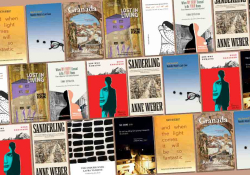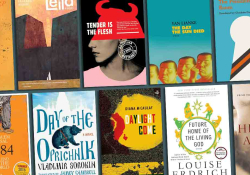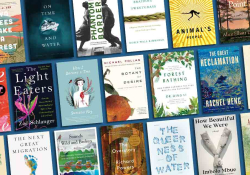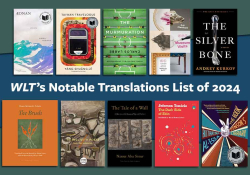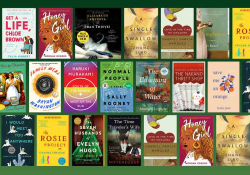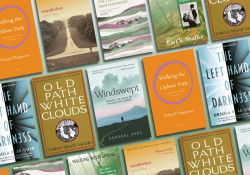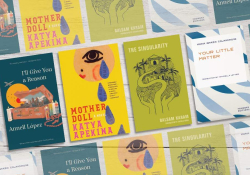12 Books for Tolerance and Understanding (2023)
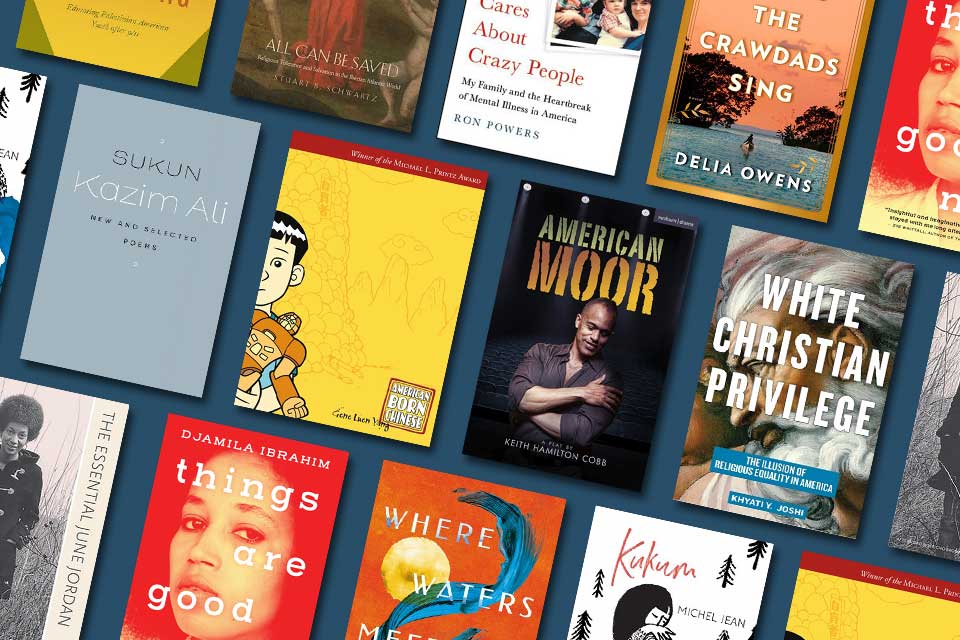 For years, a prognostication by Johann Wolfgang von Goethe appeared on the masthead page of World Literature Today: “These journals, as they reach a wider public, will contribute most effectively to the universal world literature for which we are hoping. There can be no question, however, of nations thinking alike. The aim is simply that they shall grow aware of one another, understand one another, and, even where they may not be able to love, may at least tolerate one another” (On Art and Antiquity, 1828).
For years, a prognostication by Johann Wolfgang von Goethe appeared on the masthead page of World Literature Today: “These journals, as they reach a wider public, will contribute most effectively to the universal world literature for which we are hoping. There can be no question, however, of nations thinking alike. The aim is simply that they shall grow aware of one another, understand one another, and, even where they may not be able to love, may at least tolerate one another” (On Art and Antiquity, 1828).
In 2017 WLT published a special issue devoted to “Belief in an Age of Intolerance,” and in 2018 a booklist called “11 Books for Tolerance and Understanding.” The issue and the booklist were intended to facilitate reflection, promote tolerance, and foster understanding. WLT published the list on November 16 in conjunction with the International Day for Tolerance and in the spirit of UNESCO’s 1995 Declaration of Principles on Tolerance.
Five years later, the editors of WLT decided to compile a new booklist for this year’s Day for Tolerance, drawn from recommendations by University of Oklahoma faculty/grad students and featuring teachable books on the theme of tolerance especially from a literary, cultural, and/or historical perspective. (N.B. Links to all twelve books can be found on WLT’s Bookshop page.)
The etymology of tolerance in English is rooted in the Latin tollere (to lift up) and the Greek tlēnai (to bear). In this time of murderous intolerance, the editors hope that the following booklist will give readers a reason to lift one another up and to bear the weight of historical injustices and current violence.
June Jordan
The Essential June Jordan
Ed. Jan Heller Levi & Christoph Keller
Copper Canyon Press, 2021
June Jordan’s work is always current. She wrote with a deep passion and understood the ways language and love serve as a bridge between all that divides us. — Kalenda Eaton, Associate Professor, Department of African & African American Studies
Michel Jean
Kukum
Trans. Susan Ouriou
House of Anansi Press, 2023
Kukum tells the story of Michel Jean’s great-grandmother, a newly arrived white settler who marries an Innu from Pekuakami (in what is now called the province of Quebec). She joins her husband and his family on their annual canoe journeys from the summer village to the winter hunting grounds. The biography-novel traces the changes that transform Innu society during the twentieth century: logging and log-driving, enforced sedentarism, boarding schools, departure for urban centers. I recommend the book because it tells, with grace, precision, and incisive generosity, a story of survivance (survival + resistance) in the midst of ongoing colonial violence. — Julie Tolliver, Associate Professor, Department of English
Zhang Ling
Where Waters Meet
Amazon Crossing, 2023
In this compelling narrative, a Chinese Canadian woman recounts her mother’s harrowing odyssey through the tumultuous history of twentieth-century China. As the story unfolds, she unveils her mother’s deeply buried trauma: her experience as a comfort woman in the Japanese army during World War II. Through this cross-cultural narrative, the Chinese mother’s trauma extends beyond national boundaries, transforming into a shared human experience that beckons understanding, tolerance, and empathy. — Ping Zhu, Professor of Modern Chinese Literature, Department of Modern Languages, Literatures, and Linguistics
Keith Hamilton Cobb
American Moor
Bloomsbury, 2020
A fiftysomething, experienced African American stage actor auditions for a thirtysomething Caucasian director for the lead role in Shakespeare’s Othello. Written as a performance piece for two voices (director heard but not seen) and one actor onstage, this drama shows an audience through spoken interior monologue the actor’s response to the direction being given during the audition as well as the audition itself. Strong emotional content. — Elizabeth Ballard, Adjunct Lecturer, OU School of Drama
Stuart B. Schwartz
All Can Be Saved: Religious Tolerance and Salvation in the Iberian Atlantic World
Yale University Press, 2008
Using records from the Spanish and Portuguese Inquisitions, Schwartz argues that the Iberian empires were the most religiously tolerant societies in the early modern Atlantic world. Hundreds of cases attest to the presence of vernacular cultures of religious toleration based on such practical maxims as “Everyone, if they lead good lives, can be saved in their own law.” Thus the diverse peoples of Brazil and Mexico traded, quarreled, intermarried, and got along despite disparate faiths. Witty, sexy, hilarious in places, the book tells the deadly serious story of ordinary people living together in harsh and complicated circumstances. — Raphael Folsom, Associate Professor, Department of History
Thea Renda Abu El-Haj
Unsettled Belonging: Educating Palestinian American Youth after 9/11
University of Chicago Press, 2015
Professor Abu El-Haj’s recent ethnography portrays how Palestinian-diasporic youth in the United States face intolerance on the basis of American ideals of tolerance: an apparent paradox that she persuasively explains. Unsettled Belonging is a landmark study of Palestinians in a post-9/11 America, with renewed relevance in the contemporary moment. The book exposes the limits of liberal multiculturalism within American public schools and shows the strategies of racially/religiously minoritized youth in navigating American intolerance. — David Shuang Song, Assistant Professor, Honors College
Khyati Y. Joshi
White Christian Privilege: The Illusion of Religious Equality in America
NYU Press, 2020
In a world that is increasingly focused on diversity and inclusion, one of the types of diversity that tends to receive less attention is religious diversity. This is particularly salient in Oklahoma, where people tend to presume that “everyone” is Christian and that Christianity itself is a “neutral” norm. Joshi’s book tackles the problem of Christian assumptions and Christian privilege head-on, with data-driven analysis and insightful critique. — Marie Dallam, Professor, Honors College
Djamila Ibrahim
“Heading Somewhere,” in Things Are Good Now
House of Anansi Press, 2018
I use selections from this collection of short stories in my “African Migrations” course. Djamila Ibrahim is Ethiopian-Canadian, and her work explores the Ethiopian diaspora. Ibrahim’s stories often examine relationships between people with very different identities: different genders, races, religions, and nationalities. Ibrahim asks how people live together in a world where so much seems to divide them. Tolerance is at play in Ibrahim’s work, but she does not offer easy answers or simple resolutions. Instead, she tells stories of love and migration about characters who are faced with impossible choices. — Daniel Mains, Professor, Honors College
Gene Luen Yang
American Born Chinese
First Second, 2006
American Born Chinese (2006) is the best-known graphic novel by NSK Neustadt Prize winner Gene Luen Yang. Three stories woven into one, this graphic novel focuses on the experiences of a Chinese American boy confronted with anti-Asian prejudice at school. With the help of the legendary character of the Monkey King, Jin Wang learns to respect, express, enjoy, and love his cultural identity. Recently adapted into a television series on Disney+, American Born Chinese is one of the best examples of how the graphic novel is now recognized as a unique and impressive form of literary art. — James Zeigler, Associate Professor, Department of English
Ron Powers
No One Cares about Crazy People: The Chaos and Heartbreak of Mental Health in America
Hachette, 2017
Powers’s masterpiece combines the history of mental health care for people with schizophrenia with his personal story of his sons, both of whom suffered from schizophrenia. This book helped me through a difficult time when someone I knew tried to commit an act of domestic terrorism, with the media revealing in the aftermath that he had a mental illness I had known nothing about. Deeply empathetic, thoroughly researched, and powerfully written, No One Cares about Crazy People provides the understanding necessary to extend tolerance to a group of people we consistently fail to understand and support. — Daniel Thompson, PhD student, Gaylord College
Delia Owens
Where the Crawdads Sing
G. P. Putnam’s Sons, 2018
Delia Owens’s Where the Crawdads Sing explores the tolerance and intolerance of a coastal community in North Carolina. The protagonist, Kya, is alienated by the community’s intolerance of her poverty and her lifestyle. Her friends and allies, on the other hand, are characterized by their unique capacity for tolerance and compassion toward her. The climax of the novel occurs in a courtroom, where these opposing sentiments clash over Kya’s freedom. The community, represented by the jury, is eventually moved to acquit her by those who understand and respect her despite her differences, and tolerance emerges triumphant. — Skye Curtis, Graduate Teaching Assistant, School of Music
Kazim Ali
Sukun: New and Selected Poems
Wesleyan University Press, 2023
In his 2010 essay “Faith and Silence,” Kazim Ali writes: “If there are a hundred unmentioned books in the world, it stands to reason, my father thought, that all peoples of the world, in all various times, must have had revelatory texts—why would anyone be left out of salvation, he wondered?” That essay serves as the coda to Sukun, Ali’s collection of new and selected poems. Article 1.3 of the UNESCO declaration proclaims that tolerance “involves the rejection of dogmatism and absolutism.” If readers were to truly appreciate the poetry that undergirds the “revelatory texts” of every faith tradition, the light of tolerance and understanding might prevail over the poisonous absolutisms of 2023. — Daniel Simon, Editor in Chief, WLT
University of Oklahoma
